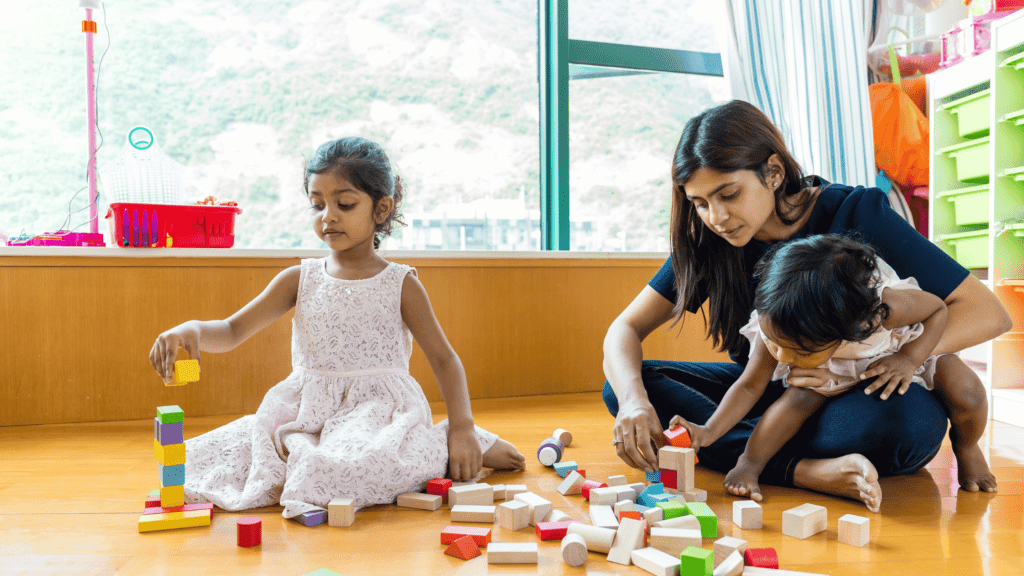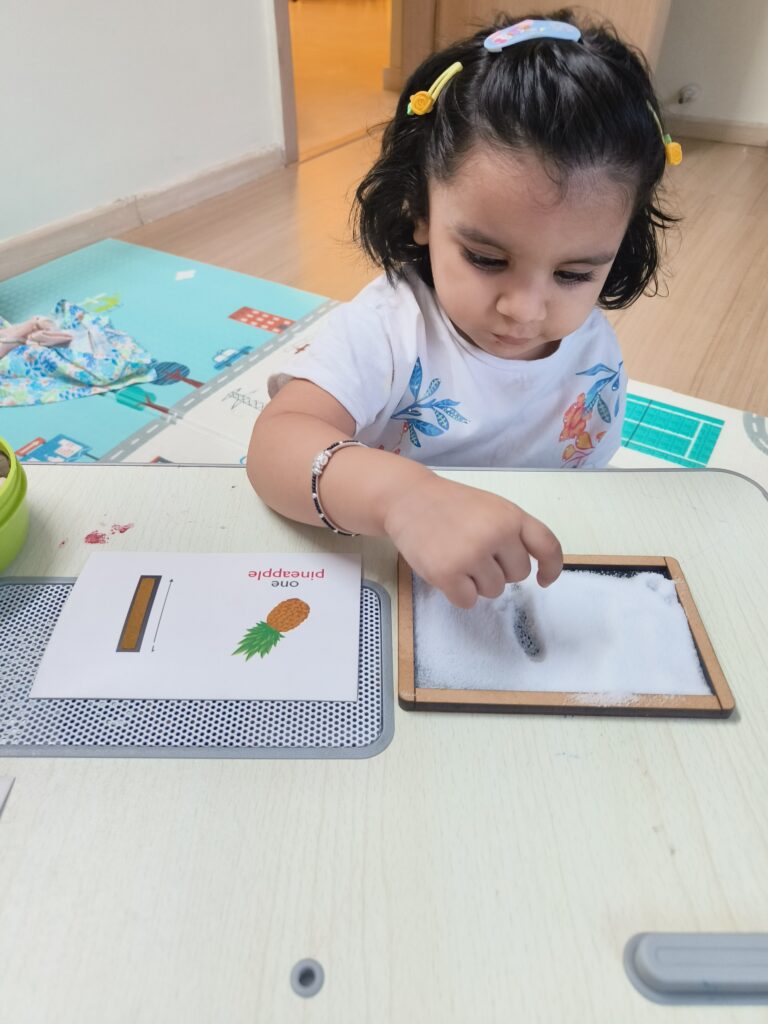Imagine your 2.5-year-old coming from playschool, opening their wardrobe, taking out their clothes and wearing them on their own. Surprised? This is exactly my daughter did a few days back. I was as proud as you are. This is the benefit of introducing Montessori at home.
Hi, I am Sakshi, a mother of 2.5 year old and a Montessori parent. Want to know how I implement Montessori parenting at my home? Follow me below.
“The child is both a hope and a promise for mankind.” – Maria Montessori
You might have heard about Montessori misconceptions that Montessori education is only meant for a proper Montessori school and can’t be implemented at home. But, that’s not true. The Montessori parenting style can absolutely be incorporated into your family. Even Maria Montessori started teaching children in a home setting (casa de Bambini) that later converted into a proper school. To learn how to implement Montessori parenting style, let us first understand what is Montessori parenting and how it benefits the child.
What is Montessori Parenting?
Parenting is a journey filled with choices, each influencing our children’s growth and development. Montessori parenting is a gentle parenting style that uses the methods and principles of the Montessori classroom in the home. Dr. Maria Montessori (the founder of Montessori education) believed that children should lead their learning path. Parents, guides, and caregivers play a vital role in creating a safe, stimulating, and well-prepared environment that enables children to learn at their own speed while gaining practical skills that are valuable in the real world.
This is also reflected in her writings. “Never help a child with a task at which he feels he can succeed.”
Have you ever in a situation where your child fails or struggles to complete a task? And what we do in such situation? We, adults, are in a rush to help them by saying “let me help you”, or “I am here” or we are in a rush to get the job done and move to the next task. We do not understand that the child has the capacity to learn, fail and excel.
As Montessori parents, we should have faith in our children and grant them the freedom and chance to explore at their own rhythm. Let us refrain from assuming roles as rescuers, enforcers, or oppressors.
Also Read – What is the letter formation of Alphabets and Why it’s important?
How to Implement Montessori Parenting at home?
Let me now tell you my secret of being a Montessori parent:
Step #1: Nurturing Independence from the Start
One of the defining features of Montessori parenting is its focus on fostering independence from a young age. For example, I allow my daughter to do daily chores such as bringing a glass of water and pouring water into it or folding her clothes. These seemingly small tasks lay the foundation for self-reliance. Montessori parents believe that children can take charge of their own learning and development when provided with the right tools and guidance.
Step #2: A Prepared Environment for Exploration
Second important thing that needs to be done is to set up a prepared environment that supports a child’s natural inclination to explore. No need to set up a fancy room, just provide a low level open shelf where you can place puzzles, sensory bins or even art supplies. This way you are proving a welcoming environment that invites children to engage in activities that spark their curiosity and creativity.
Step #3: Follow the Child
“Follow the child” is more than a mere mantra; it’s a philosophy that underpins the Montessori method. It helps the parents to follow their children’s natural curiosity, desire to explore and understand the world around them. By observing their interests, preferences, and developmental stages, we parents should provide them the environment that nurtures their unique potential.
Step #4: Understand your child’s sensitive period
In our previous blog, we highlighted a specific stage in which children are more eager to acquire various skills. These include weaning, speaking, and moving, among others. We as parents have to give enough opportunities for them to enhance that skill. Such as when my daughter started showing writing needs, I introduced her to sandpaper letters and rice trays. See below image.
Step #5: Cultivating a Love for Learning
Montessori parenting emphasizes great importance on cultivating a love for learning that extends beyond the classroom. Instead of focusing solely on academic achievement, this approach encourages children to discover their passions and pursue knowledge for the sheer joy of it. By following the child’s interests and allowing them to delve deeply into subjects, Montessori parents nurture a lifelong thirst for learning. For example, when my daughter was mere 1.5 years old, she observed me how I do gardening and later after a few days she was more interested in sowing seeds on her own. I also introduced different flowers and colors using flash cards.
Step #6: Embracing Individuality
In a world that often pushes conformity, Montessori parenting celebrates individuality. Each child is seen as a unique individual with their own strengths, preferences, and challenges. As Montessori parents, we need to take the time to observe and understand their child’s needs, adapting their approach to best support their growth. When my daughter began expressing a curiosity for painting, I took the opportunity to acquaint her with a wide array of artistic techniques. We explored the world of finger painting, vegetable painting, brush painting, sculpture painting, cotton bud painting, and much more. I also created a dedicated art space at home, where she has access to a variety of art supplies, to encourage their creative expression.
Please note: with smaller children (below 6 years) please be careful and vigilant.
Step #7: Discipline
Being parents can be sometimes overwhelming and being working professionals, this job is even more difficult. We often end up raising our voices on them or rather hitting them. Instead, we can implement a combination of natural and logical consequences. How, see below example:
- Natural consequence: When a child plays in their room and don’t clean up once they are done. The room remains messy and the next day when they need a particular activity/toy, they couldn’t find it and ends up not playing.
- Logical consequence: When a child plays in their room and leaves the toys on the floor. You invite them to clean the room together. This way they understand how to do the task and importance of cleaning up once they are done playing.
Both of these situations are gentle and Montessori aligned, resulting in fostering discipline rather than punishment.
Step #8: Effective Praising
Have you ever used phrases “very good”, “good job”, “correct”, “excellent” or any other such words? Please stop! If we constantly praise a child’s final outcome, we actually limit their opportunities to foster inherent motivation. Instead, I say to my daughter is “I noticed you putting in all your effort, you should feel really proud of yourself.” This will help boost their confidence and encourage them to explore more.
Step #9: Emotional Intelligence
Montessori education goes beyond academics and focuses on nurturing emotional intelligence in children. Therefore, I encourage my child to express her feelings, understand others’ emotions, nurture empathy and find constructive ways to handle conflicts.
Step #10: Model Right Behavior
Children love to imitate us. If you keep frustrated and overwhelmed with your struggles, they will also adapt. Instead, tell your child how you are feeling and set the behavior expectations. Listen to them and ask them why they are behaving like this and why they are frustrated. Tell them this is not the nicest way to do, and they are free to discuss their feelings with you. By following this approach, you will establish an effective parenting style that will greatly benefit your children.
Final Thoughts on Montessori Parenting
As we navigate the complex world of parenting, embracing the tenets of Montessori philosophy can empower us to guide our children with grace and intentionality. By incorporating these 10 points into your parenting approach, you will embark on a remarkable journey towards practicing Montessori-style parenting as I did.
Do let us know in the comment section if you notice any difference in children’s growth and behavior after implementing a Montessori parenting style.




